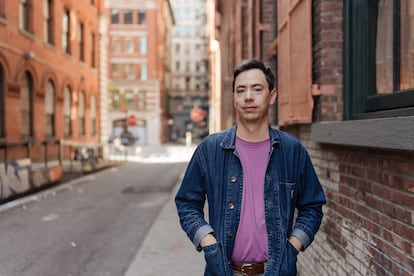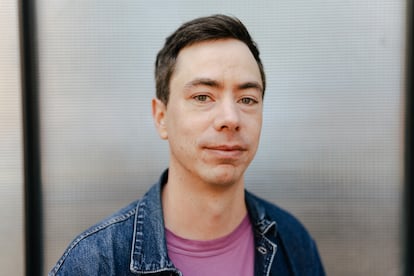Kyle Chayka, journalist: ‘In cultural industries it doesn’t matter what you do, but how many followers you have’
The author of ‘Filterworld’ talks to EL PAÍS about algorithmic anxiety, the difference between content and art, and why culture requires effort

Kyle Chayka, 35, is a journalist for the New Yorker Magazine, where he has a column about technology and culture on the internet. He is concerned about the dissemination of art online and has just published a second book, Filterworld: How Algorithms Have Flattened Culture, which looks at the difficulty of finding new artistic experiences in a data-driven world. His first book was on a similar topic: the decline of the minimalist movement in the age of Instagram.
Question. What is Filterworld?
Answer. It took me a long time to come up with the title for this book. I wanted to describe how we are surrounded by algorithmic recommendations. No single phrase could capture that. We say that we’re online or attached to our phone, but there’s nothing that describes this environment around us all the time. “Filterworld” came to me to show that we’re surrounded by algorithms. Everything around us is filtered through digital platforms.
Q. Does it make our life worse?
A. I think so. It makes our lives more boring, less interesting. Algorithmic recommendations always offer things that reinforce our point of view. We’re not as surprised. We’re not as challenged. The way that we’ve become habituated to all of these algorithmic feeds and platforms have made us more passive as cultural consumers. We accept whatever comes to us and are less likely to look for something different.
Q. In the book, you say that nothing new is coming out anymore. How do you know?
A. It is hard to point to data, because new things are being made all the time. There’s always a new musician, a new book, or a new influencer account on Instagram. I talked to a lot of people who sensed this ennui or boredom that nothing felt new. Things were novel, newly made, but not innovative. But it’s hard to prove. Many have complained over the past two millenia that culture is boring and I don’t want to fall into that trap, but what has changed is how we consume culture. Ten or 20 years ago, we were not consuming things through data-driven digital platforms. Many human decisions were made to put something on TV, release a record or promote a book. That feeling of boredom comes from how much of culture is now dictated by data in a more explicit and aggressive way.
Q. You quote Martin Scorsese’s saying that today everything is content. How is content different from art?
A. “Content” is a very convenient word because we’re consuming everything through the same channels. It doesn’t matter if it’s a song, an article or a screenshot of a poem, it’s all traveling through Instagram and TikTok. Whereas art is something that moves us, that challenges our preconceived notions. My background is in art criticism and art history and the definition of art has always been that when someone intends to create art, then that is art. I don’t think people creating for digital platforms are trying to create art. The influencer video looking around a Bali villa is not a piece of art because there’s no intention to make art. There’s just the intention to make content, to attract engagment and get attention.
Q. Is that why you are worried that every artist has to start as an influencer?
A. In any industry what matters is not what you’re making, but how many followers you have. Do you want to do something, do you want to make an album, put out a book? Okay, but who is your audience? That’s pretty bad, it severely limits who enters the cultural industry. It pressures people to build their persona, to act like a celebrity before they are a celebrity, to focus not on the thing itself, not on the music or the art, but on their online persona, like the selfies they’re posting, the clothes they’re wearing.
Q. Years ago control was human, not algorithmic. Was it better?
A. The question of whether it is good or bad is always tough because we’re living in the reality that we’re in. Before everything was about human gatekeepers who decided what to promote and they had their own biases and problems. Now, the dominant mode is algorithmic control. You don’t have the access problem, anyone can publish something, but you are judged only by your metrics. Whether a person really likes what you do isn’t going to make much difference if you’re not getting likes and followers. If the algorithm is not noticing you, you are failing in a way. We need a balance.

Q. Before, if you came from a rich family it was easier for you to get into an important institution. That’s still the case now, but if you have fewer resources you can try to get in by building a following on TikTok or YouTube.
A. It is the question of access. Now anyone can put out their song or video. It is a way to elevate a lot of voices that wouldn’t get noticed before. The internet has been good for many people, including myself, but success on the internet often comes in very set styles. The things that succeed are often more similar to each other than they are different. So you can reach an audience, but you’re only going to reach a huge audience if you game the system and adapt to the algorithmic feed. There’s a clash between organic creativity and algorithmic adaptation. I talk to painter friends who need to promote themselves on Instagram to reach curators and gallerists. But to be successful his paintings need to look a certain way, they have to look good, they have to be brightly colored flat images. That distribution puts aesthetic pressures on people.
Q. An advantage of the internet is that it contains everything.
A. And that is really healthy. It’s good for us consumers because you can access anything on YouTube, like a weird video from 1978. It’s inspiring. But the production of content can become a distraction from the production of art. In a perfect world, you wouldn’t have to commercialize yourself to be an artist, you wouldn’t have to worry about what you were wearing or where you were going on vacation. It turns everyone into public personas instead of just artists.
Q. Why is collecting important in the digital age?
A. We overestimated how permanent digital content. What’s important about actually collecting things is that you can hold on to them forever. It may not work, maybe the Blu-Ray technology is outdated or you have to buy something vintage to make it work, but at least it’s still there and it’s still in the same form. Whereas Spotify is always changing how it presents music. You’re really just renting access to your music. That changes my relationship to the music. When Spotify makes changes it makes you more likely to listen to one thing versus another. It’s important to have that collection so you can preserve how you experience it. In the same way that an art museum provides a great experience of a painting, you want to have a great experience of a piece of music that’s not constantly trying to get you to listen to something else.
Q. What is algorithmic anxiety?
A. It is an academic term coined by a sociologist who was at Airbnb as a data analyst. She interviewed Airbnb hosts about how they were feeling and found that they were very anxious. They didn’t know why their search result was super low or why people weren’t booking their house. And they resorted to all kinds of funny tricks to try to get the algorithm’s attention, like changing their calendar dates or reshuffling their photos. They resorted to these superstitious actions because they had no agency, they couldn’t control how the algorithm works. There’s no one to complain to, you can’t call Airbnb and ask, ‘why is my house not getting rented.’ He identified that as a form of anxiety, but I think we all have it. We’re all like Airbnb hosts. We’re all forced to negotiate with an algorithm that we don’t understand. So we have algorithmic anxiety about who views our stories on Instagram, what shows Netflix recommends to us.
Q. Filterworld will be translated into 10 languages. It is a success. You are managing algorithmic anxiety well.
A. It’s funny. From the earliest stages of my book, I was very conscious that to be successful, I would have to adapt to the algorithm. I would have to design the book to make it work. If I had to guess why it was successful it’s because we all have these feelings and reactions on the internet. I’m not the only one freaking out here.
Q. The book seems pessimistic, but the conclusion is that, as in other times, culture requires effort.
A. Algorithms changed cultural discovery because suddenly everything was personalized for us and we lost the sense of effort. But the effort is what makes the experience meaningful. If a 15-year-old watched 100 Bergman clips on TikTok, that director wouldn’t change his life in the same way as if he had to hunt him down, figure out how to access his work, and then work to understand him. The effort of finding that culture, the effort of sitting down and trying to understand it, has unfortunately been lost and if we get that back, we will have a better experience of the culture. Things will have more meaning to us if we’re not bombarded by a thousand different pieces of music, art and images a day.
Q. Is it bad that we can easily make new cultural discoveries?
A. Yes. It’s almost like Tinder. Why settle when there’s always 100 other options around the corner? You look at the Netflix homepage and there are two dozen different options that look good and are all in your interests. It’s hard to stick with something. You choose to try and see how you feel afterwards. When you have all of those options, you’re more likely to skip away at any second.
Q. Are you sure you would trust more in the human gatekeepers of before?
A. You can never trust completely. There is always the sense that something is being withheld or that your attention is being directed. What I want to encourage people to do, or what I hope happens now on the internet, is that we have a wide variety of curators instead of gatekeepers. We have many voices we can pay attention to. And I hope that we can find those individual voices. The first step is to find them, like the DJ you like on TikTok or the writer you like on a newsletter. And step two, which is even more important, is to support them, to do something to make this act of curation sustainable. I think we outsource that curation to algorithms that don’t need money. We can choose our own gatekeepers now, we can pick the gatekeeping system that we want, but we just have to be conscious of how it works and how to keep it going.
Q. Is Filterworld ending?
A. When I finished the book I realized that it was about the 2010s, about a period in history that is in decline. The last decade we lived through the popularization of huge digital platforms. Now we’re realizing that those systems are not good for us, they’re not providing good experiences and they’re exploiting a lot of people. The globalization of platforms is not necessarily a good thing. So I think it’s ending. User sentiment has changed. Regulation is also changing, like in the EU. I don’t think it’s completely per se, but it’s deconstructing, coming apart. In 2017 Facebook seemed like the inevitable endpoint of the internet, now we know that’s not the case.
Q. And where are we heading?
A. The most interesting stuff happening is in smaller spaces, not on TikTok. It’s not about getting millions of views on TikTok or YouTube. It’s happening in a closed Discord room or on a niche newsletter. They are specific spaces in which people can be freer to express themselves, try out ideas and be experimental. I haven’t talked much about the very tense arena of public speech online: you don’t want to say the wrong opinion, you’re likely to get attacked for almost anything, and that limits how you express yourself. In a smaller space, particularly in a cultural sense, people are freer to experiment and create new things.
Sign up for our weekly newsletter to get more English-language news coverage from EL PAÍS USA Edition
Tu suscripción se está usando en otro dispositivo
¿Quieres añadir otro usuario a tu suscripción?
Si continúas leyendo en este dispositivo, no se podrá leer en el otro.
FlechaTu suscripción se está usando en otro dispositivo y solo puedes acceder a EL PAÍS desde un dispositivo a la vez.
Si quieres compartir tu cuenta, cambia tu suscripción a la modalidad Premium, así podrás añadir otro usuario. Cada uno accederá con su propia cuenta de email, lo que os permitirá personalizar vuestra experiencia en EL PAÍS.
¿Tienes una suscripción de empresa? Accede aquí para contratar más cuentas.
En el caso de no saber quién está usando tu cuenta, te recomendamos cambiar tu contraseña aquí.
Si decides continuar compartiendo tu cuenta, este mensaje se mostrará en tu dispositivo y en el de la otra persona que está usando tu cuenta de forma indefinida, afectando a tu experiencia de lectura. Puedes consultar aquí los términos y condiciones de la suscripción digital.









































